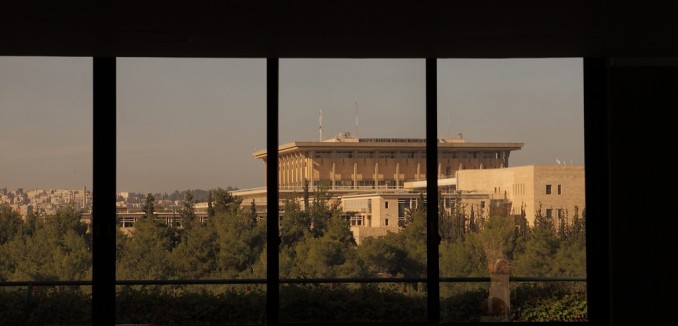Before the last election in Israel in January 2013, American punditry was rife with speculation about the “Shift to the Right” among Israelis, according to which the Jewish state had morphed into an unrecognizable haven of unbridled nationalism. After the elections shattered the myth, suggesting a far more plausible shift to the center away from both Left and Right extremes, many of the pundits shifted into a new mantra, surrounding the political “weakness” of Prime Minister Benjamin Netanyahu. This too proved to be little more than wishful thinking, given that his Likud-Beiteinu party had garnered more seats than his Likud party had in the previous election in 2009, that it was way ahead of the second-place party while in 2009 his Likud actually had fewer seats than Kadima, and that he had far more coalition options than he had the previous time around.
This week, a new poll showed that despite a dramatic increase in global uncertainty, internal turmoil over the drafting of ultra-Orthodox Jews, difficulties with the United States over the peace talks and Iran, and raging conflicts all around, Israelis have been more or less unmoved politically. Netanyahu’s Likud-Beiteinu is seen increasing from 31 Knesset seats to 34 — but the gain can mostly be attributed to attrition of voters from the ultra-Orthodox Shas party with the passage of their spiritual leader, Rabbi Ovadiah Yosef. On the Left, both Labor and the far-Left Meretz show significant gains (from 15 to 19, 6 to 10 respectively), but these changes come entirely at the expense of Yair Lapid’s Yesh Atid party (from 19 to 11), whose voters are traditionally on the Left.
And little is left of the once-ruling Kadima party, which offered an unlikely marriage of disaffected left-wing voters with former Likud politicians. With the passage of Ariel Sharon and former Prime Minister Ehud Olmert facing an indefinite political wilderness, voters have little interest in their heirs: In the current poll, Tzipi Livni’s Hatnua party gets only 4 seats, while Shaul Mofaz’s Kadima doesn’t pass the minimum for Knesset representation. (On a technical note, these polls do not factor in the recent change in the electoral threshold, which pollsters suggest has yet to have been internalized by respondents.)
Polls are obviously just polls, and a lot can happen between now and the next election, slated for 2017. But the data suggest that we should be exceptionally careful about believing narratives spun by far-away, ideologically driven commentators egging for political change. Despite dramatic swings of circumstance around the world, both political and economic, Israeli voters have shown a remarkable consistency in their voting blocs over the years, with changes mostly at the margins, especially in the thirteen-plus years since the start of the Second Intifada and the resultant collapse of the Israeli peace movement.
Meanwhile, Netanyahu has become the second-longest-serving prime minister in Israeli history after David Ben-Gurion, the Israeli economy remains strong and growing, and the Jewish state has continued to thrive remarkably while everything around it turns to blood and ash. Of course Israel has not been immune to the regional turmoil, as events this week both in its North and South have proven. But compared with earlier periods in Israeli history, recent years have been unusually successful and stable–a period that may not last, but should at least be seen for the remarkable time that it has been.
[Photo: zeeweez / flickr]




